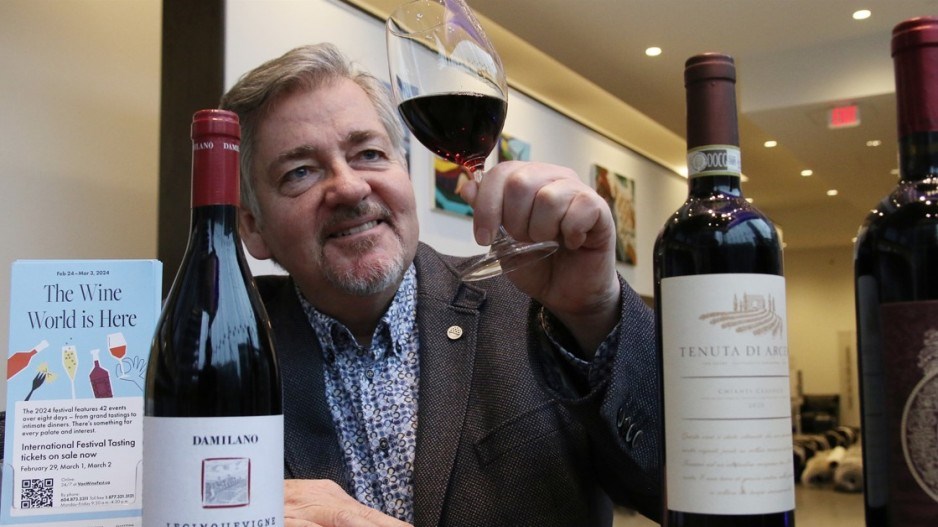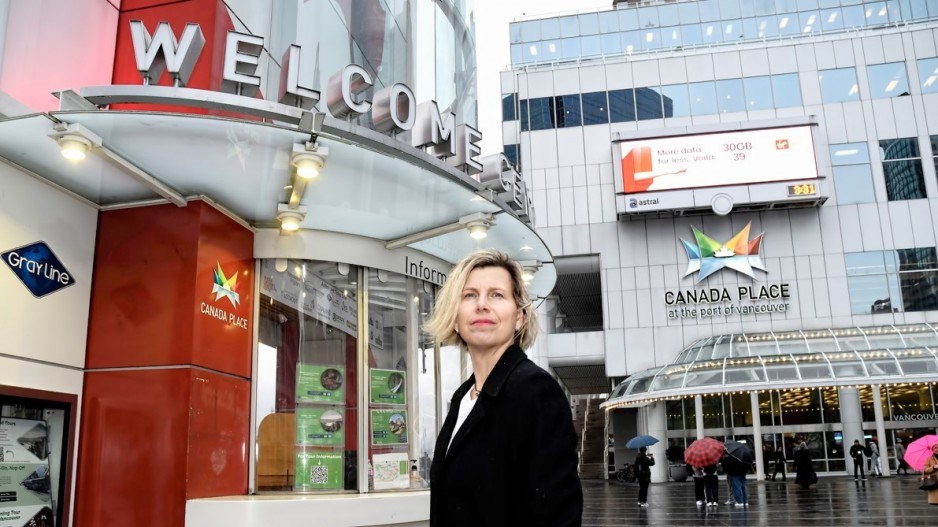Steady gains in the number of visitors to B.C. has reinvigorated the province’s tourism sector, but the full return to pre-pandemic levels is not complete, nor is the ongoing recovery registering evenly across regions.
Destinations such as the Vancouver Art Gallery (VAG) tend to be representative of the industry.
“If you overlay our numbers, they usually match counts at the airport, passengers on cruise ships and especially downtown Vancouver visitation and downtown hotels,” CEO Anthony Kiendl told BIV.
Kiendl said his organization has yet to return to pre-pandemic admission levels but that he is “optimistic” his gallery will soon get there.
VAG saw 179,448 admissions in 2023, up 11 per cent from the year before. That total includes both visitors who paid and those who did not.
His destination’s visitor counts vary widely, he said, and they depend on the season, the weather and what exhibition is on display.
“When it rains or snows, our attendance goes way up,” he said.
Substantial interest in the gallery’s J.E.H. MacDonald? A Tangled Garden exhibition, which opened Dec. 16 and runs until May 12, has helped double VAG’s attendance compared with what Kiendl would have otherwise expected at this time of year, he said.

For the thousands of tourism and hospitality businesses across the province, the return to pre-pandemic operational capacity has been hit and miss.
Activity in the Metro Vancouver and Okanagan tourism regions has largely returned to where it was before the onset of COVID-19 – or will soon be at that level. Other regions are lagging, according to go2HR’s B.C. Tourism and Hospitality Employment Tracker, which Statistics Canada data.
Go2HR data tracker shows the number of tourism and hospitality jobs in B.C. in December was nearly 2.3 per cent below the 352,250 jobs the province’s tourism and hospitality sector had in December 2019.
The sector has recovered from widespread pandemic job losses, but it now employs fewer people and offers fewer jobs than it did in 2019. The overall unemployment rate in the tourism and hospitality dropped to 3.8 per cent in December 2023, from 4.6 per cent in the same month four years earlier.
“Not every job that existed in 2019 exists today because through the pandemic there were changes in job responsibilities and how companies are organized,” explained go2HR CEO Krista Bax. “You could have just fewer positions in the sector.”
She said regions that are hardest hit include Northern B.C. and the Cariboo.
“They didn’t see the peak summer visitor count that they would typically have,” she said. “I don’t think there’s one answer around why people are not travelling up there.”
It could be that the kind of traveller who formerly went on outfitting or camping trips to those regions has simply not got back in the habit of doing so, she suggested.
Go2HR’s website enables users to navigate tabs to instantly see years’ worth of charts illustrating employment and job trends by region, as well as by subsector within tourism and hospitality.
The data shows that employment in 2023 had not fully recovered to pre-pandemic levels in areas such as accommodation, food and beverage, and travel and transportation.
In contrast, recreation and entertainment stands out as a subsector experiencing massive job gains.
The 110,500 British Columbians employed in the recreation and entertainment subsector in December was nearly 37.3 per cent higher than the 80,500 people employed in that subsector in 2019.
“We’re talking about ski,” Bax said. “In the summer, there are attractions such as golf, cultural centres, museums, Butchart Gardens, waterslides and more.”
One ominous sign for B.C. tourism and the province’s economy overall is job declines in the food and beverage industry.
Last month, that tourism and hospitality subsector had 136,750 employees, down 19.7 per cent from the 163,750 people employed four years earlier.
Bax said that she expects the decline in jobs in that large niche within tourism and hospitality to continue because many restaurant owners facing financial challenges and are unable to pay back their Canada Emergency Business Account (CEBA) loans.
BC Restaurant and Foodservices Association CEO Ian Tostenson told BIV that between 10 and 14 per cent of the more than 15,000 restaurants in the province could close as a result of the federal government not extending its deadline for repaying CEBA loans.
Businesses were given the option in 2020 to apply for up to $60,000 in interest-free loans that would have to be paid back by Dec. 31, 2022.
The federal government extended that deadline to Dec. 31, 2023 and then by a nominal few weeks to Jan. 18.
Businesses that paid back $40,000 by the deadline were eligible to keep the remaining $20,000 as a grant.
Tostenson explained that some restaurant owners are stretched so thin that requiring them to repay the full $60,000 loan, plus up to $3,000 in interest in the first year if they miss the repayment deadline, is enough to push them into receivership.
Destination Vancouver aims to make tourism in the region less seasonal
The first three months of the year tend to be slower ones for Vancouver’s tourism sector, even though nearby ski resorts attract visitors to the area.
Rosewood Hotel Georgia director of sales and marketing Paul Li told BIV that this is why his hotel closed for renovations between January and March. The hotel is losing revenue by closing, but it is the best time of the year to get the renovations done, he said.
Destination Vancouver has been actively promoting events in the early parts of the year to help even out monthly revenue for tourism-sector businesses.
“The big initiative is to really try to drive year-round visitation, and to have visitors come up now and in the winter,” Destination Vancouver CEO Royce Chwin told BIV.
That’s why his organization is the lead organizer for the Dine Out Vancouver Festival, held Jan. 17 through Feb. 4. The event includes 390 restaurants in Metro Vancouver that are offering fixed-price, three-course meals at enticing prices.
“We’re running that festival at this time because it is historically slow,” Chwin said.
His organization also helps sponsor the Vancouver International Wine Festival (VIWF), which is set to take place Feb. 24 through March 3.
That festival is known for its large public wine tasting events at the Vancouver Convention Centre, where 149 wineries from 12 countries are expected to pour about four wines each. This year will feature 71 Italian wineries – the most ever under one roof at a B.C. event.
The festival also includes 15 dinners, where sponsoring winery principals are on hand to discuss their wines.
Interest in tickets for those dinners has been higher than ever this year.
“Tickets for the dinners went on sale Jan. 3, and we sold the most dinners in one day ever – it was crazy,” VIWF executive director Harry Hertscheg told BIV.
“We sold out nine or 10 dinners on that first day.”

Airport passenger counts rise as capacity increases, new routes launch
Good news for the tourism sector came in October, when the number of international visitors to Canada through B.C. entry ports finally exceeded the count for visitors in an equivalent month pre-pandemic.
B.C. welcomed 498,586 international visitors in October, up by 7,766 people – nearly 1.6 per cent – from the 490,820 international visitors in October 2019, according to Statistics Canada.
November, however, was a softer month for international visits, as 383,850 non-residents entered Canada through B.C. entry points. That is down 9.8 per cent from the 425,693 visitors counted in November 2019.
Vancouver Airport Authority’s (VAA) data for the Vancouver International Airport (YVR) shows a similar trend, where arrivals finally passed 2019 passenger levels only to retreat.
VAA data for November showed that YVR’s monthly passenger count surpassed the equivalent month in 2019 for the second consecutive time. Data for December will likely be out soon.
There were 1,886,936 passengers who either boarded or disembarked planes at YVR in November, according to the VAA – nearly half of one per cent more than the 1,878,207 passengers who did so in November 2019.
VAA CEO Tamara Vrooman in December projected that her airport would see approximately two million passengers that month – 7.2 per cent less than the 2,155,151 passengers who arrived or departed YVR in December 2019.
VAA’s weekly visitor count projections in January similarly expected lower passenger levels.
Overall capacity on planes is up, however, when compared with pre-pandemic capacity.
VAA manager of air service development Nathaniel Wong told BIV that the total capacity on airlines at YVR is up by about one per cent, compared with 2019.
The grounding of Boeing 737 Max 9 planes is not having much impact because few of those planes flew to YVR, he said.
Flights within North America and Latin America exceed 2019 capacity levels whereas capacity on flights to Europe lags at about two per cent below pre-pandemic capacity, he said.
Capacity on flights in the Asia-Pacific region has been hardest hit and is currently at about 77 per cent of its pre-pandemic level.
“China bilaterals continue to be the limiting factor for this [regional] sector, but there are key markets that are at pre-pandemic levels,” Wong said.
“Australia, New Zealand, Taiwan, Japan and South Korea are already at or close to pre-pandemic levels. Hong Kong has been recovering well also.”
New airlines will be arriving: Japanese airline Zipair starts non-stop flights between YVR and Tokyo’s Narita International Airport (NRT) in March.
Airlines are also increasing capacity: United Airlines (Nasdaq:UAL) has added capacity between YVR and Dallas, San Francisco and Chicago.
Air Canada (TSX:AC), similarly, has loaded more capacity on routes between YVR and airports such as NRT, Hong Kong International Airport and Seoul’s Incheon International Airport.
American Airlines (Nasdaq:AAL) launches non-stop flights between YVR and North Carolina’s Charlotte Douglas International Airport this summer.
Westjet will add non-stop flights between YVR and Detroit Metropolitan Wayne County Airport starting April 28.
“Air Canada also launches direct to Singapore in early April, and it started direct to Dubai this past November,” Wong said.





